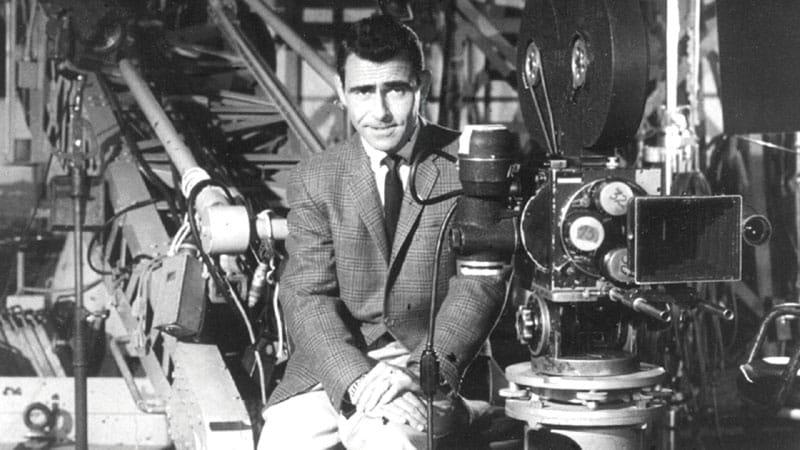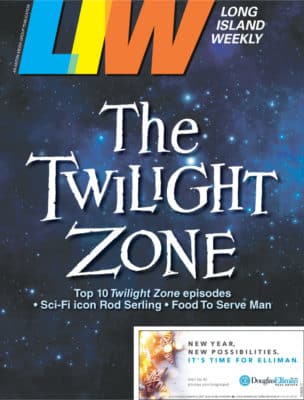
This year marks the 60th anniversary of the initial airing of The Twilight Zone. For the first five years of its existence, the 156 episodes that composed the series touched on all manner of topics including racism, war and censorship. Rodman Edward Serling presented it all through a prism of science fiction, fantasy, horror and the paranormal that always ended with a twist. Along with being the series narrator, Serling’s role as the show’s creator, producer and lead screenwriter found him earning the reputation of being the “angry young man” of Hollywood, thanks to his pitched battles with sponsors and television executives over topics the latter felt would discomfort viewers.
Serling was born on Dec. 25, 1924, in Syracuse, the second of two boys to grocer and butcher Sam and homemaker mom Esther. According to his older brother Robert, the younger Serling grew up spending hours acting out dialogue from pulp magazines and movies he’d seen. Despite being considered a class clown, his seventh-grade teacher encouraged him to enter the school’s public speaking extracurriculars. Eventually joining the debate team, Serling started writing for the school newspaper and became known for being a bit of a social activist.
With World War II in full swing, Serling enlisted right out of high school, eventually serving in the 511th Parachute Infantry Regimen of the 11th Airborne Division. Deployed to the Pacific Ocean theater, the New York native saw combat at the Battle of Leyte in the Phillipines and later marched into Manila as part of General Douglas MacArthur’s to wrest control of the city from the Japanese. By war’s end, Serling’s combat experiences found him being awarded a Purple Heart, the Bronze Star and the Philippine Liberation Medal. The nightmares and flashbacks he grappled with for the remainder of his life shaped his writing and resonated deeply with him. He later admitted, “I was bitter about everything and at loose ends when I got out of the service. I think I turned to writing to get it off my chest.”
Post-war, Serling volunteered as an actor and writer at WNYC in New York. Constantly hustling radio scripts over the next few years, the freelancing scribe changed gears and started penning material for the newly emerging television format. By the time he submitted his 72nd script, it wound up being picked up by the nationwide Kraft Television Theatre. The episode was dubbed “Patterns” and was an intense big-business drama that revolved around corporate politics and boardroom backstabbing and starred Richard Kiley, Everett Sloane and Ed Begley. Patterns proved so popular, it earned a repeat performance, a rarity for a live television drama. It earned Serling the first of six Emmys for dramatic writing.
Following this success up with a Playhouse 90 teleplay called Requiem for a Heavyweight (later adapted as a 1962 film by the same name), Serling was next able to eventually maneuver into creating an anthology series that became The Twilight Zone and aired its debut episode on Oct. 2, 1959, on CBS. For the next five years, Serling fought to maintain creative control and despite winning awards and earning enormous critical acclaim, lukewarm ratings led to a pair of cancellations. By 1964, Serling’s behind-the-scenes battles led to his deciding to not fight the show’s third and final cancellation.
Serling’s post-Twilight Zone career found him writing screenplays for 1963’s The Yellow Canary and 1964’s Seven Days in May along with cowriting the script for 1968’s Planet of the Apes with formerly blacklisted screenwriter Michael Wilson.
In addition to dabbling in radio (“The Zero Hour”; “Fantasy Park”) and teaching at Ithaca College, Serling last forays into television included the CBS western The Loner (1965-1966) and the NBC anthology series Night Gallery (1969-1973).
Serling smoked three to four packs of cigarettes a day and after suffering a heart attack on May 3, 1975, two more followed, with the final one occurring in the middle of a 10-hour open-heart surgical procedure. He died two days later on June 28. Rod Serling was 50 years old. He left behind an enormous legacy that not only defined many television industry standards, but used entertainment to educate viewers about socially conscious topics.



















